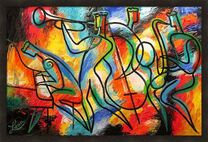 My September post considered some responses to a few very new musical works. I’ve also been reading some other posts about the merits (or not) of various styles of new ‘classical’ music. By ‘new’ the writers often include everything from Stravinsky’s The Rite of Spring (1913) and Schoenberg’s Erwartung (1924) right up to the present day. That’s rather interesting, given that one hundred years after the composition of works by composers of earlier centuries, their music would hardly still be considered ‘new’ or ‘modern’ or ‘difficult’ to listen to. I’m not going to add more personal views or responses or insights to a debate which has generated numerous blogs, editorials, books, articles and other media sources on the topic. However, there are many interesting and informative opinions and explorations readily available such as a 2010 article in The Guardian by Alex Ross, or Colin Eatock’s “What’s Wrong with Classical Music? or discussion forums such as Trumpetherald.com or Talk Classical or Luke Muehlhauser’s A beginner’s guide to modern classical music, and many more. Plato is credited with the idea that “Opinion is the lowest form of human knowledge. It requires no accountability, no understanding.” So, while there’s no point in being dogmatic about our opinions on new classical music, as a reviewer I often find myself desperately looking for positive comments on new works, perhaps believing that I have no right to condemn a new piece after a single hearing. But occasionally, just occasionally, a new work totally blows me away. My previous post mentioned two such works which featured in last month’s Musikfest Berlin: Heiner Goebbels’ A House of Call and Ondřej Adámek’s Where are you? (Note that those two links are just trailers, although there is a complete audio-only recording of the latter on YouTube, but, for me, the visual element is an essential part of the work). There have been a few others during the last forty-or-so years, especially miniatures such as Henryk Gorecki’s Totus Tuus and major works like James MacMillan’s Seven Last Words from the Cross, particularly the 3rd movement – Verily I say unto You. Many of the world’s composer community believe that the writing of, or attempting to write, masterpieces is no longer relevant or even possible. The word ‘elitist’ has often been applied to classical music, mostly by people who have not acquired the ability – emotional experience/growth – understanding – call-it-what-you-will. If that’s what makes any music elitist, then isn’t that the same as, say, rocket science or brain surgery being elitist? And why not, therefore, call some of the more esoteric styles of popular music elitist; there’s even a style called Esoteric Pop! Whatever the logic, let’s, at least, not use the word ‘elite’ to mean supercilious or condescending in a snobby sense.. Some commentators even go as far as calling classical music ‘racist’! Have a read of Lebanese Druze composer Nebal Maysaud’s articles on NewMusicBox, especially the most recent called It’s Time to let classical music die. The sixty comments by readers of the article also broaden, develop, or offer different insights into Maysaud’s perspectives, but the fact that comments are now closed is a bit suppressive in itself surely? In the 18th and 19th centuries concert promoters and opera houses could not have survived without satisfying the public’s huge appetite for new works. One only has to read American writer Blanche Roosevelt’s account of the days that led up to the première of Verdi’s Otello in Milan and the première itself to understand the ‘Beatlemania’ frenzy that could be generated by a new classical music work. So what’s happened? Why have classical audiences of the past hundred years been less willing to embrace new music? There are many reasons outlined in the material that I’ve referenced above . . . or maybe there is no rational answer . . . or should we even care? . . . To each his own? And the debate goes on with superstar violinist Nigel Kennedy’s withdrawal from a recent Proms concert in London because the host radio station, Classic FM refused to allow him to play a tribute to Jimi Hendrix. Kennedy’s comments a few days after the withdrawal also make interesting reading. Is the answer to all of the above to start pulling down the genre barriers that create such counterproductive mind-sets?
0 Comments
|
AuthorTony Ryan has reviewed Christchurch concerts, opera and music theatre productions and many other theatre performances since the mid 1990s. ReviewsTony has presented live and written radio reviews of numerous concerts, opera and other musical events for RNZ Concert for many years. An archive of these reviews can be found at Radio New Zealand - Upbeat
His reviews of opera, music & straight theatre and numerous reviews of buskers and comedy festival performances are available at Theatreview. An archive of Tony’s chamber music reviews is held at Christopher’s Classics He has also reviewed for The Press (Christchurch). Links to Tony's Press reviews are listed below: 2024 Songs for Helen – Music by Chris Adams 2022 A Barber and Bernstein Double Bill – Toi Toi Opera The Strangest of Angels – NZOpera Will King (Baritone) and David Codd (Piano) – Christopher's Classics 2019 Ars Acustica – Free Theatre Truly Madly Baroque – Red Priest The Mousetrap – Lunchbox Theatre Iconoclasts – cLoud Last Night of the Proms – CSO 2018 An Evening with Simon O’Neill NZSO Catch Me If You Can – Blackboard Theatre Brothers in Arms – CSO Fear and Courage – CSO Sin City – CSO Don Giovanni – Narropera at Lansdowne Mad Hatter’s Tea Party – Funatorium Weave – NZTrio Tosca – NZ Opera 2017 Sister Act – Showbiz Broadway to West End – Theatre Royal Chicago – Court Theatre Tchaikovsky Symphony No. 5 – CSO Homage – CSO Last Night of the Proms – CSO SOAR – NZTrio Pianomania – NZSO Rogers & Hammerstein – Showbiz Songs for Nobodies – Ali Harper The Beauty of Baroque – CSO Travels in Italy – NZSO Archives
February 2024
Categories |

 RSS Feed
RSS Feed
